Holmes Institute HA2022 Business Law Assignment: Contract Issues
VerifiedAdded on 2022/11/19
|18
|2171
|304
Report
AI Summary
This business law assignment report addresses two key legal issues: contract breach and contract frustration, using the IRAC (Issue, Rule, Application, Conclusion) method. The first issue involves a minor (Ann) entering into a contract with Ted for ballet lessons, and the report analyzes whether Ted can sue Ann for breach of contract when she accepts an engagement from an outsider. The analysis considers the minor's contractual capacity, the presence of consideration, and the terms of the agreement. The second issue examines whether a fishing company's belief is correct regarding a frustrated contract. The report explores the concept of frustration, considering events that make contract performance impossible, such as the non-granting of licenses. The analysis references relevant case law, including Currie v Misa, Thomas v Thomas, Stilk v Myrick, Taylor v Caldwell, and Davis Contractors Ltd, to support the legal arguments and conclusions. The report ultimately concludes that Ted can sue Ann for contract breach and that the fishing company's belief regarding frustration is correct.
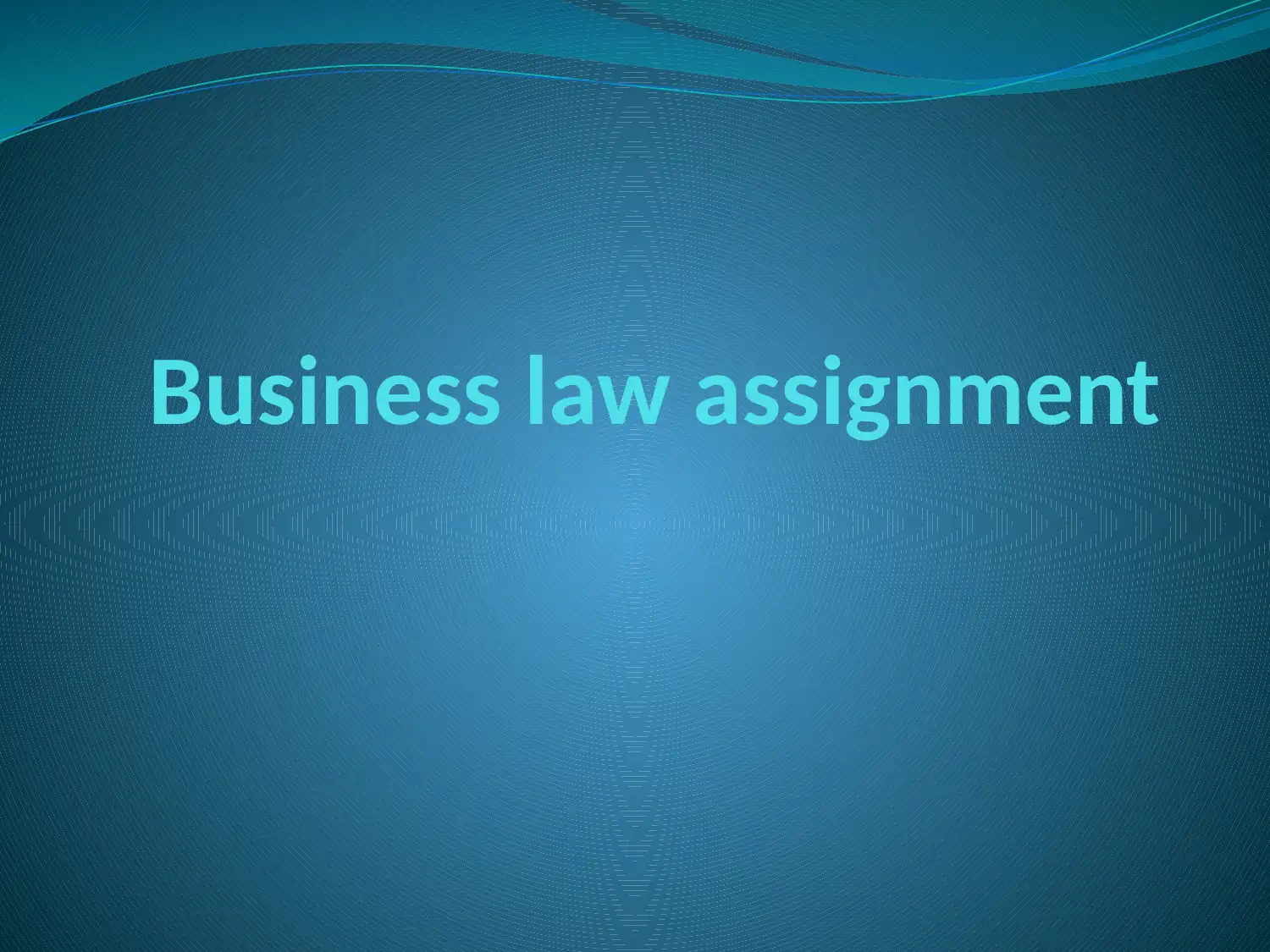
Business law assignment
Paraphrase This Document
Need a fresh take? Get an instant paraphrase of this document with our AI Paraphraser
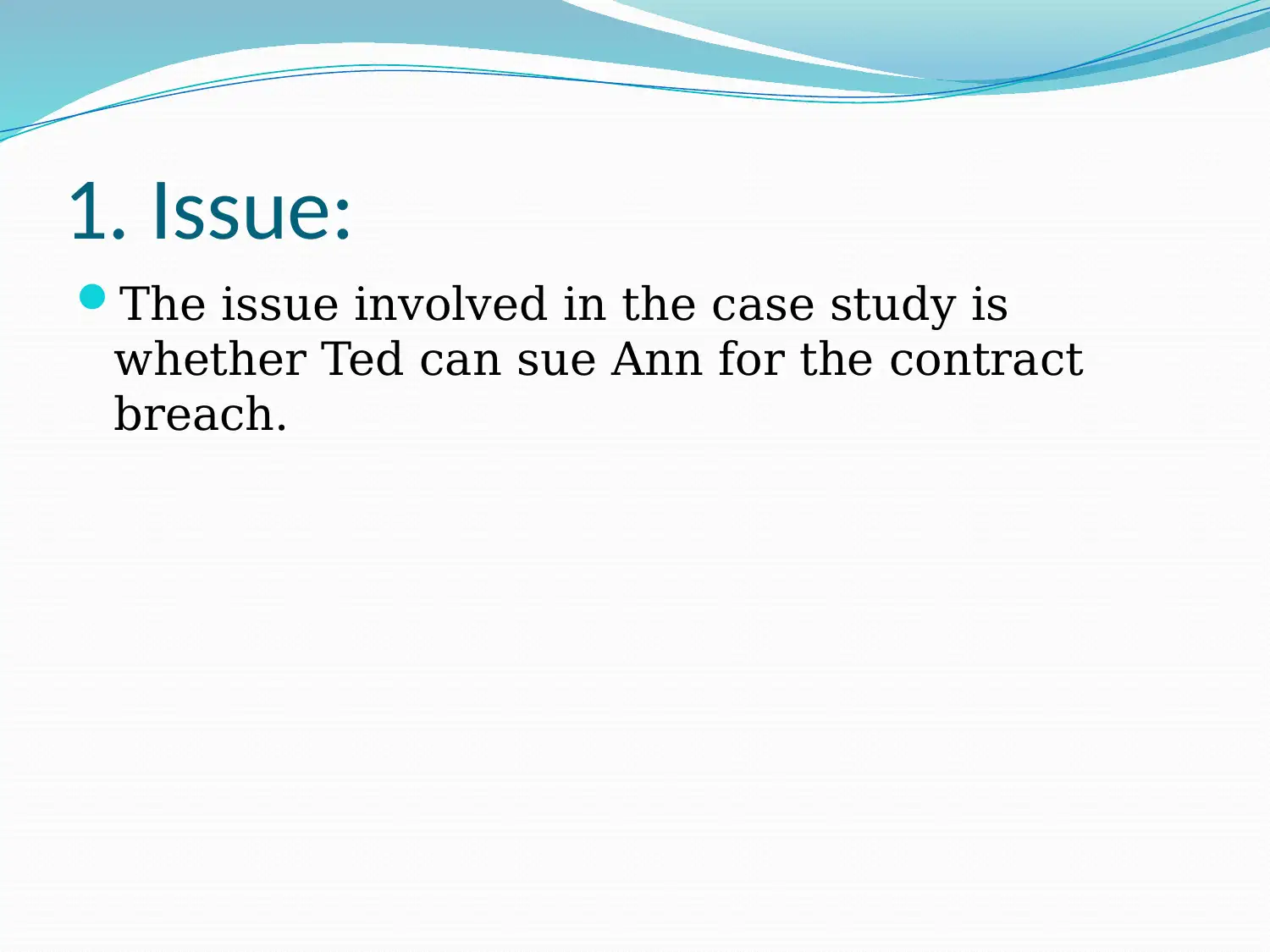
1. Issue:
The issue involved in the case study is
whether Ted can sue Ann for the contract
breach.
The issue involved in the case study is
whether Ted can sue Ann for the contract
breach.
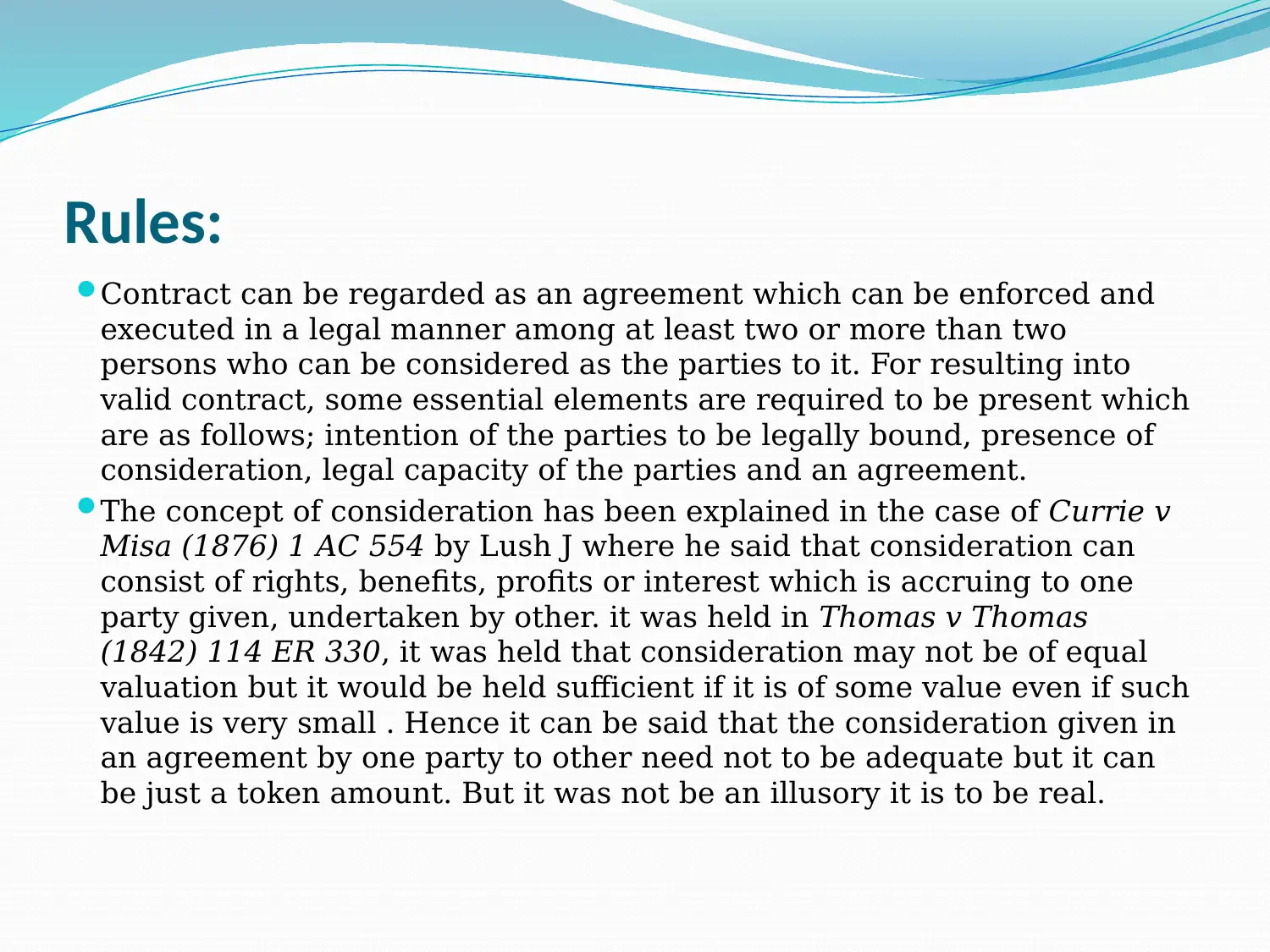
Rules:
Contract can be regarded as an agreement which can be enforced and
executed in a legal manner among at least two or more than two
persons who can be considered as the parties to it. For resulting into
valid contract, some essential elements are required to be present which
are as follows; intention of the parties to be legally bound, presence of
consideration, legal capacity of the parties and an agreement.
The concept of consideration has been explained in the case of Currie v
Misa (1876) 1 AC 554 by Lush J where he said that consideration can
consist of rights, benefits, profits or interest which is accruing to one
party given, undertaken by other. it was held in Thomas v Thomas
(1842) 114 ER 330, it was held that consideration may not be of equal
valuation but it would be held sufficient if it is of some value even if such
value is very small . Hence it can be said that the consideration given in
an agreement by one party to other need not to be adequate but it can
be just a token amount. But it was not be an illusory it is to be real.
Contract can be regarded as an agreement which can be enforced and
executed in a legal manner among at least two or more than two
persons who can be considered as the parties to it. For resulting into
valid contract, some essential elements are required to be present which
are as follows; intention of the parties to be legally bound, presence of
consideration, legal capacity of the parties and an agreement.
The concept of consideration has been explained in the case of Currie v
Misa (1876) 1 AC 554 by Lush J where he said that consideration can
consist of rights, benefits, profits or interest which is accruing to one
party given, undertaken by other. it was held in Thomas v Thomas
(1842) 114 ER 330, it was held that consideration may not be of equal
valuation but it would be held sufficient if it is of some value even if such
value is very small . Hence it can be said that the consideration given in
an agreement by one party to other need not to be adequate but it can
be just a token amount. But it was not be an illusory it is to be real.
⊘ This is a preview!⊘
Do you want full access?
Subscribe today to unlock all pages.

Trusted by 1+ million students worldwide
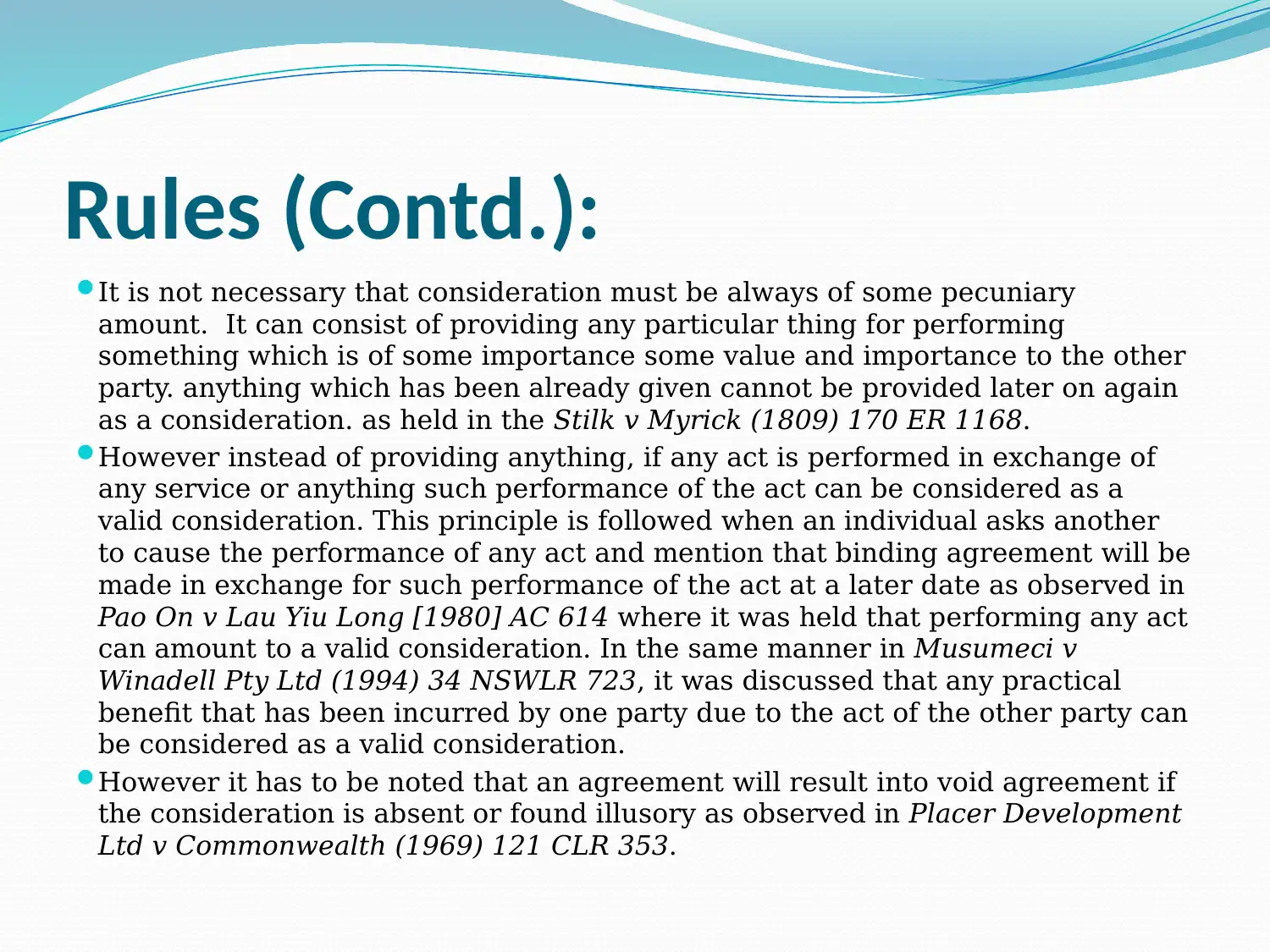
Rules (Contd.):
It is not necessary that consideration must be always of some pecuniary
amount. It can consist of providing any particular thing for performing
something which is of some importance some value and importance to the other
party. anything which has been already given cannot be provided later on again
as a consideration. as held in the Stilk v Myrick (1809) 170 ER 1168.
However instead of providing anything, if any act is performed in exchange of
any service or anything such performance of the act can be considered as a
valid consideration. This principle is followed when an individual asks another
to cause the performance of any act and mention that binding agreement will be
made in exchange for such performance of the act at a later date as observed in
Pao On v Lau Yiu Long [1980] AC 614 where it was held that performing any act
can amount to a valid consideration. In the same manner in Musumeci v
Winadell Pty Ltd (1994) 34 NSWLR 723, it was discussed that any practical
benefit that has been incurred by one party due to the act of the other party can
be considered as a valid consideration.
However it has to be noted that an agreement will result into void agreement if
the consideration is absent or found illusory as observed in Placer Development
Ltd v Commonwealth (1969) 121 CLR 353.
It is not necessary that consideration must be always of some pecuniary
amount. It can consist of providing any particular thing for performing
something which is of some importance some value and importance to the other
party. anything which has been already given cannot be provided later on again
as a consideration. as held in the Stilk v Myrick (1809) 170 ER 1168.
However instead of providing anything, if any act is performed in exchange of
any service or anything such performance of the act can be considered as a
valid consideration. This principle is followed when an individual asks another
to cause the performance of any act and mention that binding agreement will be
made in exchange for such performance of the act at a later date as observed in
Pao On v Lau Yiu Long [1980] AC 614 where it was held that performing any act
can amount to a valid consideration. In the same manner in Musumeci v
Winadell Pty Ltd (1994) 34 NSWLR 723, it was discussed that any practical
benefit that has been incurred by one party due to the act of the other party can
be considered as a valid consideration.
However it has to be noted that an agreement will result into void agreement if
the consideration is absent or found illusory as observed in Placer Development
Ltd v Commonwealth (1969) 121 CLR 353.
Paraphrase This Document
Need a fresh take? Get an instant paraphrase of this document with our AI Paraphraser
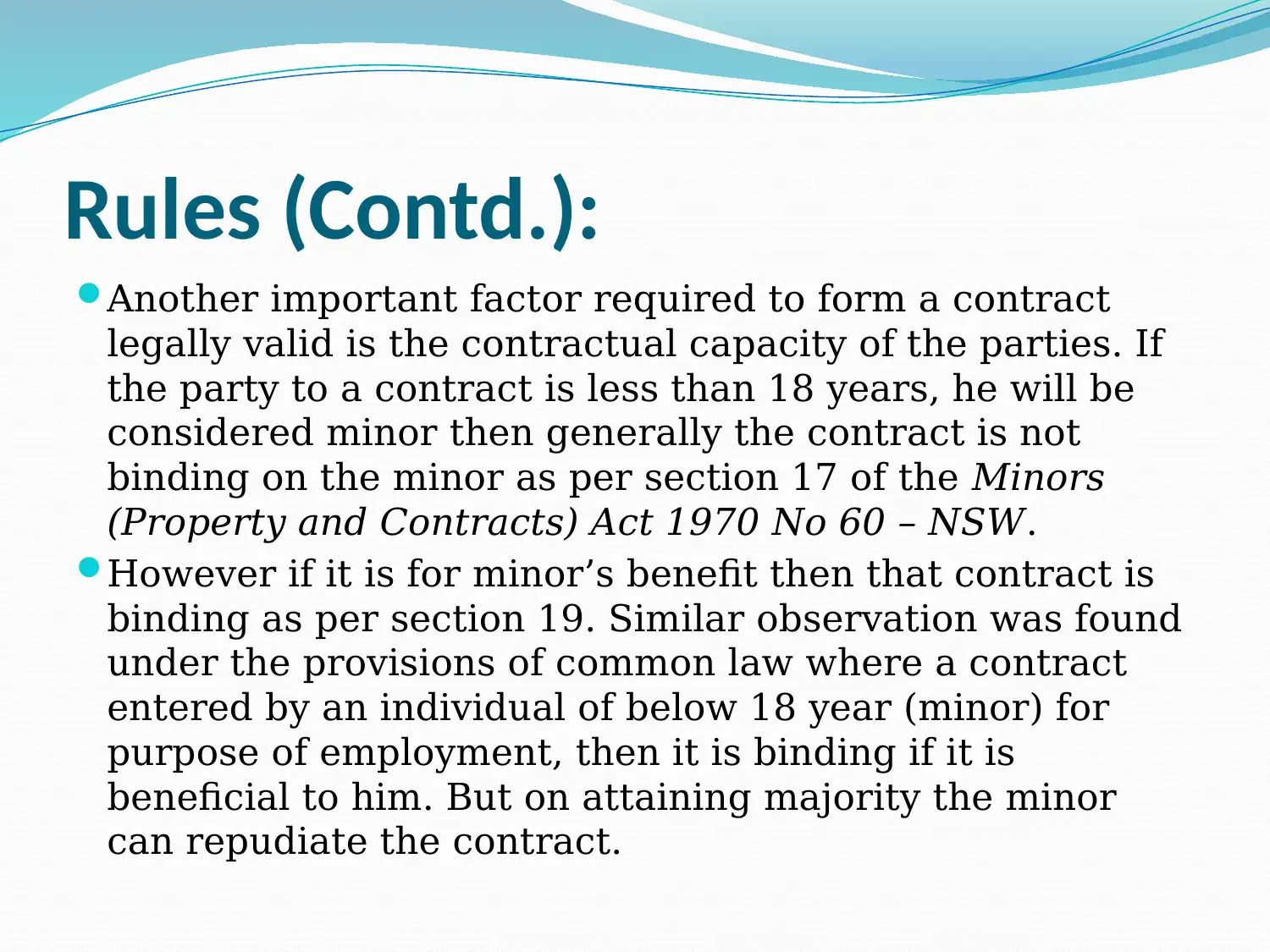
Rules (Contd.):
Another important factor required to form a contract
legally valid is the contractual capacity of the parties. If
the party to a contract is less than 18 years, he will be
considered minor then generally the contract is not
binding on the minor as per section 17 of the Minors
(Property and Contracts) Act 1970 No 60 – NSW.
However if it is for minor’s benefit then that contract is
binding as per section 19. Similar observation was found
under the provisions of common law where a contract
entered by an individual of below 18 year (minor) for
purpose of employment, then it is binding if it is
beneficial to him. But on attaining majority the minor
can repudiate the contract.
Another important factor required to form a contract
legally valid is the contractual capacity of the parties. If
the party to a contract is less than 18 years, he will be
considered minor then generally the contract is not
binding on the minor as per section 17 of the Minors
(Property and Contracts) Act 1970 No 60 – NSW.
However if it is for minor’s benefit then that contract is
binding as per section 19. Similar observation was found
under the provisions of common law where a contract
entered by an individual of below 18 year (minor) for
purpose of employment, then it is binding if it is
beneficial to him. But on attaining majority the minor
can repudiate the contract.
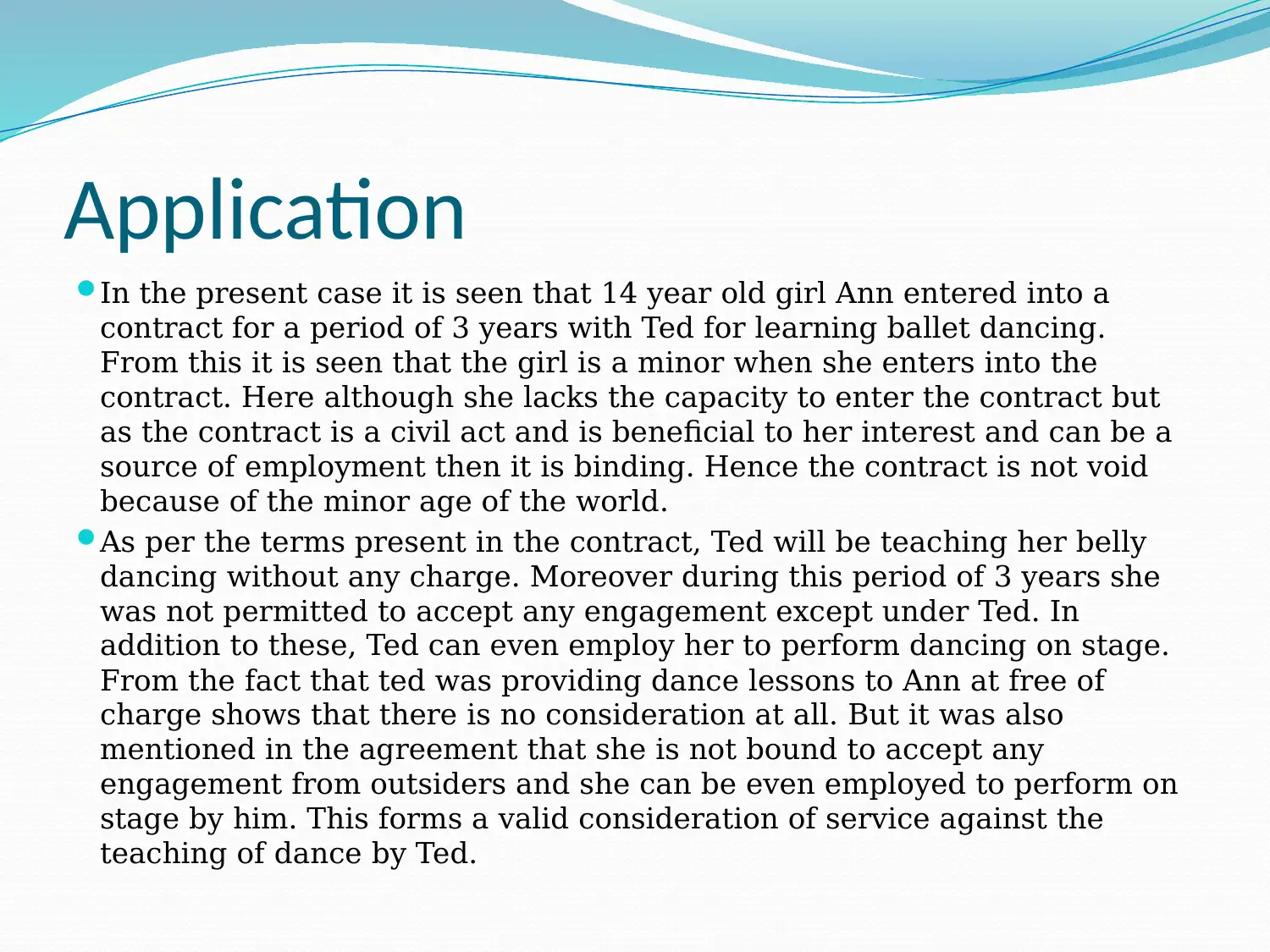
Application
In the present case it is seen that 14 year old girl Ann entered into a
contract for a period of 3 years with Ted for learning ballet dancing.
From this it is seen that the girl is a minor when she enters into the
contract. Here although she lacks the capacity to enter the contract but
as the contract is a civil act and is beneficial to her interest and can be a
source of employment then it is binding. Hence the contract is not void
because of the minor age of the world.
As per the terms present in the contract, Ted will be teaching her belly
dancing without any charge. Moreover during this period of 3 years she
was not permitted to accept any engagement except under Ted. In
addition to these, Ted can even employ her to perform dancing on stage.
From the fact that ted was providing dance lessons to Ann at free of
charge shows that there is no consideration at all. But it was also
mentioned in the agreement that she is not bound to accept any
engagement from outsiders and she can be even employed to perform on
stage by him. This forms a valid consideration of service against the
teaching of dance by Ted.
In the present case it is seen that 14 year old girl Ann entered into a
contract for a period of 3 years with Ted for learning ballet dancing.
From this it is seen that the girl is a minor when she enters into the
contract. Here although she lacks the capacity to enter the contract but
as the contract is a civil act and is beneficial to her interest and can be a
source of employment then it is binding. Hence the contract is not void
because of the minor age of the world.
As per the terms present in the contract, Ted will be teaching her belly
dancing without any charge. Moreover during this period of 3 years she
was not permitted to accept any engagement except under Ted. In
addition to these, Ted can even employ her to perform dancing on stage.
From the fact that ted was providing dance lessons to Ann at free of
charge shows that there is no consideration at all. But it was also
mentioned in the agreement that she is not bound to accept any
engagement from outsiders and she can be even employed to perform on
stage by him. This forms a valid consideration of service against the
teaching of dance by Ted.
⊘ This is a preview!⊘
Do you want full access?
Subscribe today to unlock all pages.

Trusted by 1+ million students worldwide
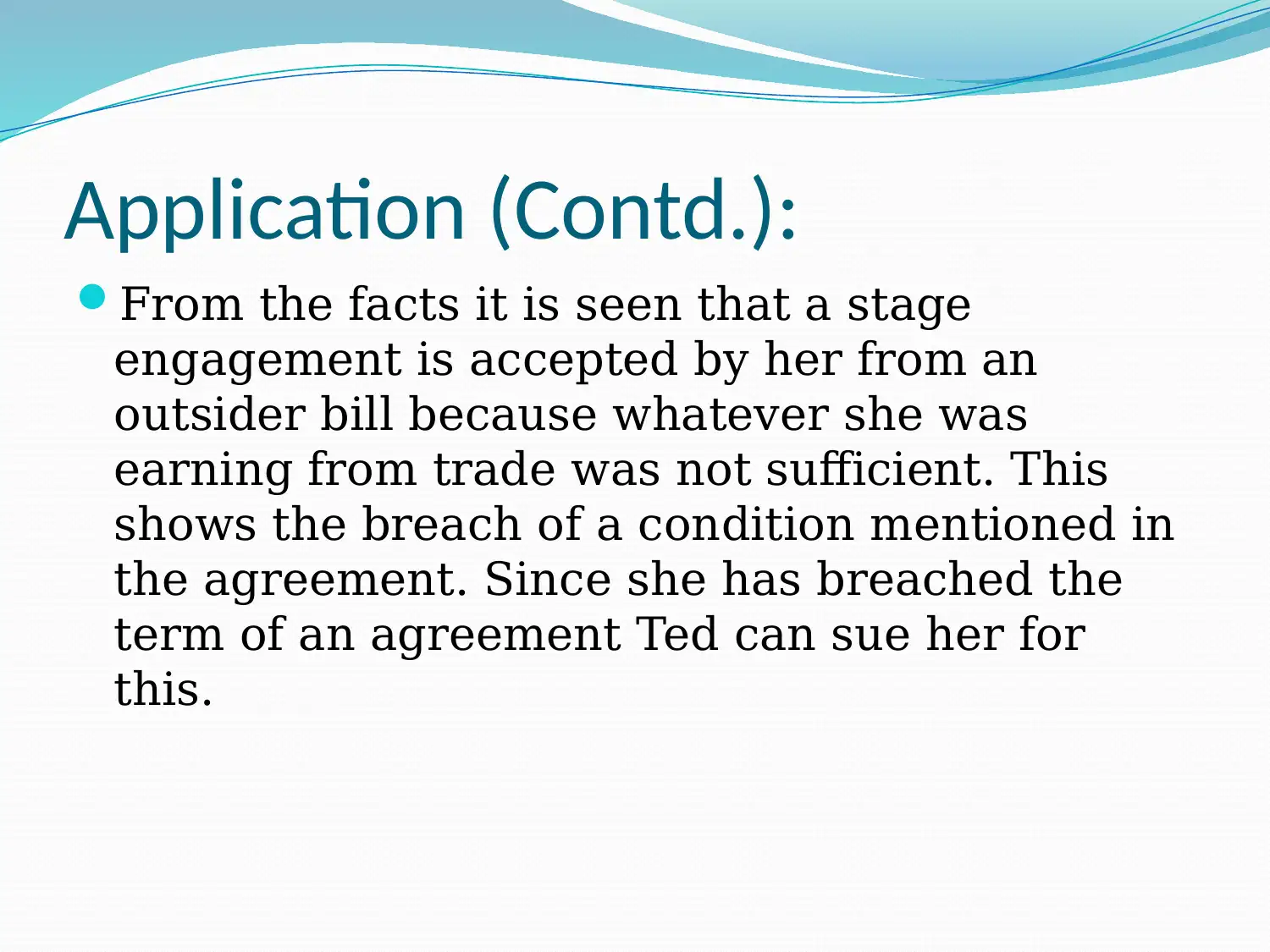
Application (Contd.):
From the facts it is seen that a stage
engagement is accepted by her from an
outsider bill because whatever she was
earning from trade was not sufficient. This
shows the breach of a condition mentioned in
the agreement. Since she has breached the
term of an agreement Ted can sue her for
this.
From the facts it is seen that a stage
engagement is accepted by her from an
outsider bill because whatever she was
earning from trade was not sufficient. This
shows the breach of a condition mentioned in
the agreement. Since she has breached the
term of an agreement Ted can sue her for
this.
Paraphrase This Document
Need a fresh take? Get an instant paraphrase of this document with our AI Paraphraser
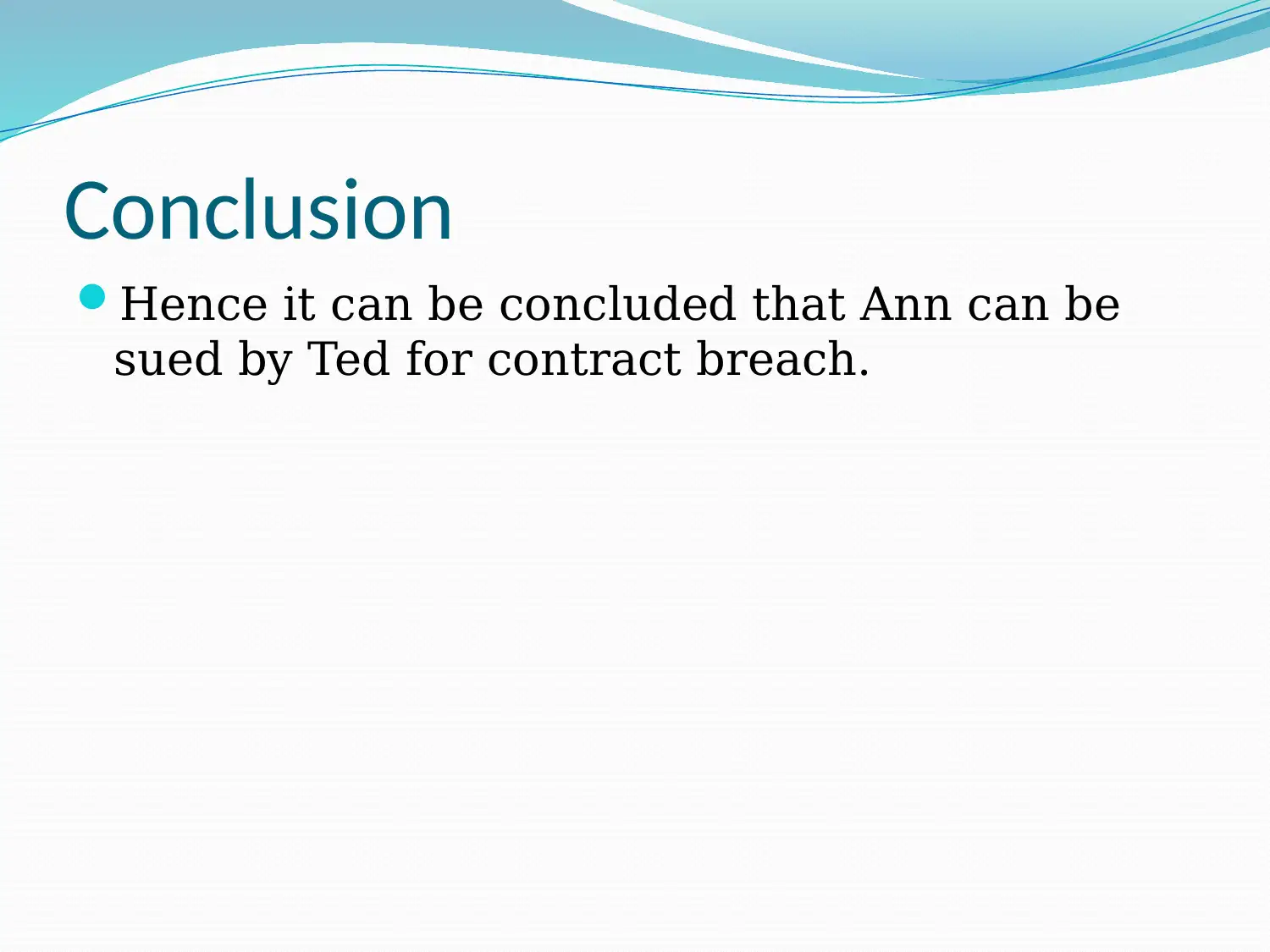
Conclusion
Hence it can be concluded that Ann can be
sued by Ted for contract breach.
Hence it can be concluded that Ann can be
sued by Ted for contract breach.
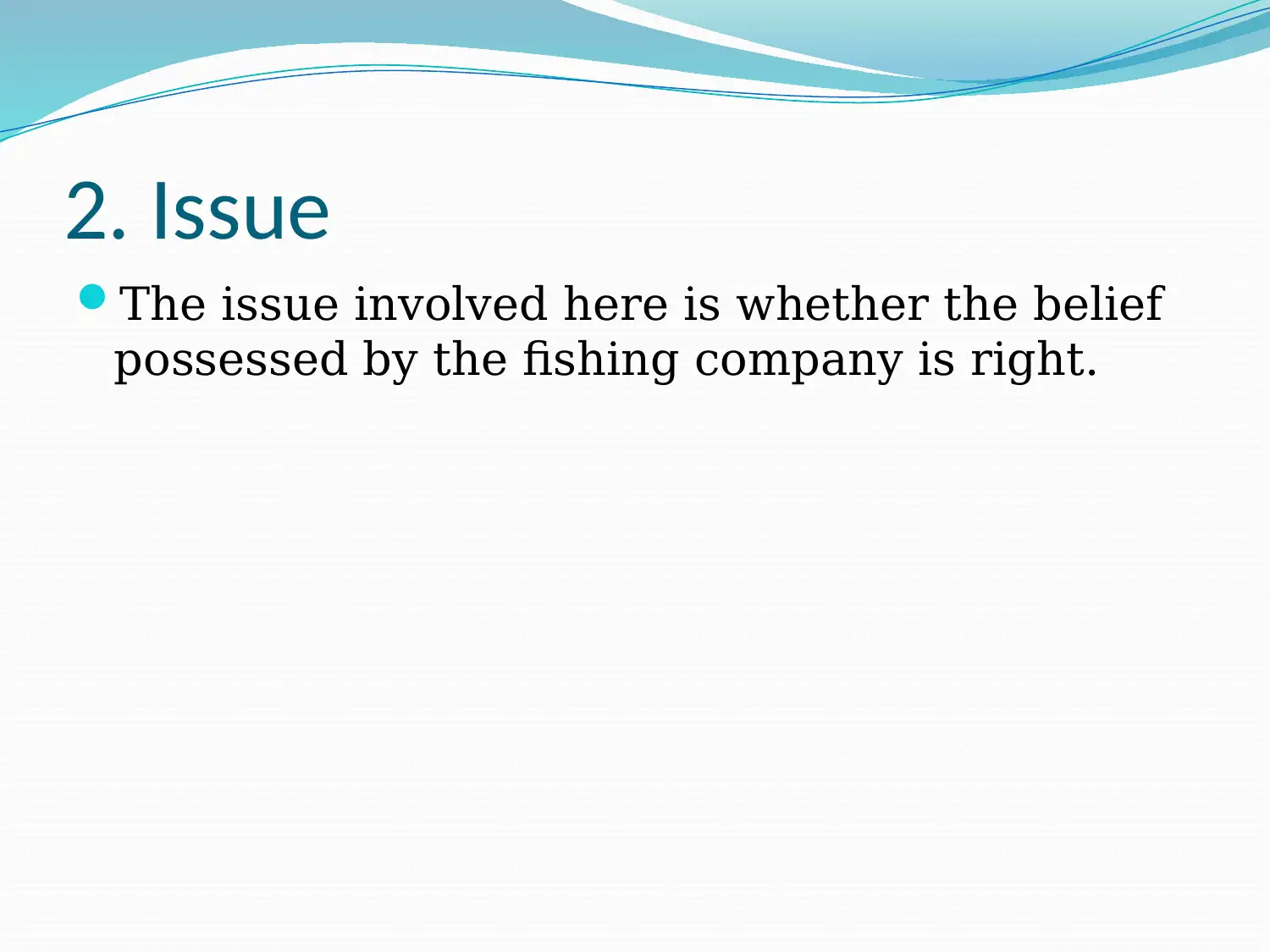
2. Issue
The issue involved here is whether the belief
possessed by the fishing company is right.
The issue involved here is whether the belief
possessed by the fishing company is right.
⊘ This is a preview!⊘
Do you want full access?
Subscribe today to unlock all pages.

Trusted by 1+ million students worldwide
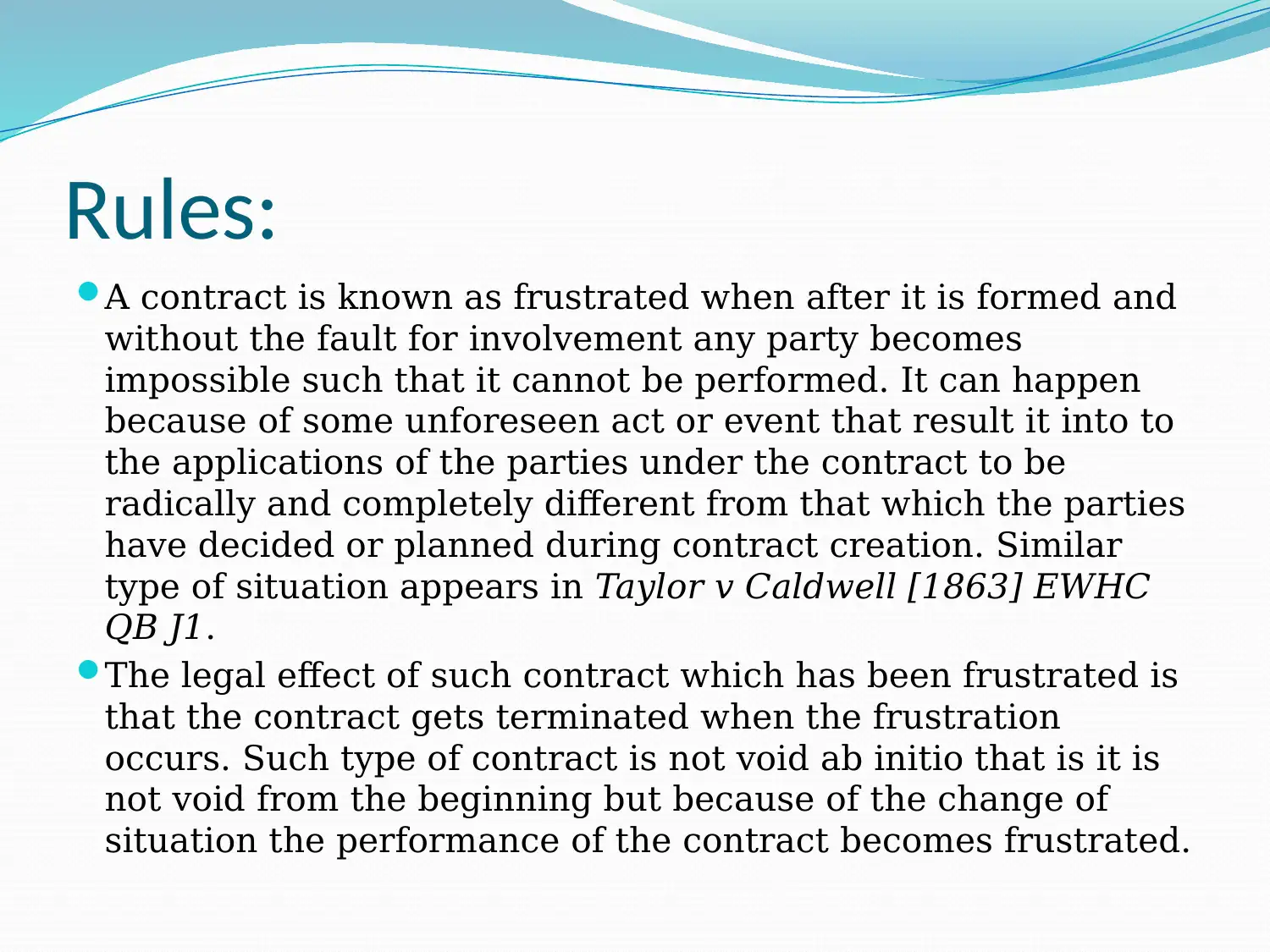
Rules:
A contract is known as frustrated when after it is formed and
without the fault for involvement any party becomes
impossible such that it cannot be performed. It can happen
because of some unforeseen act or event that result it into to
the applications of the parties under the contract to be
radically and completely different from that which the parties
have decided or planned during contract creation. Similar
type of situation appears in Taylor v Caldwell [1863] EWHC
QB J1.
The legal effect of such contract which has been frustrated is
that the contract gets terminated when the frustration
occurs. Such type of contract is not void ab initio that is it is
not void from the beginning but because of the change of
situation the performance of the contract becomes frustrated.
A contract is known as frustrated when after it is formed and
without the fault for involvement any party becomes
impossible such that it cannot be performed. It can happen
because of some unforeseen act or event that result it into to
the applications of the parties under the contract to be
radically and completely different from that which the parties
have decided or planned during contract creation. Similar
type of situation appears in Taylor v Caldwell [1863] EWHC
QB J1.
The legal effect of such contract which has been frustrated is
that the contract gets terminated when the frustration
occurs. Such type of contract is not void ab initio that is it is
not void from the beginning but because of the change of
situation the performance of the contract becomes frustrated.
Paraphrase This Document
Need a fresh take? Get an instant paraphrase of this document with our AI Paraphraser
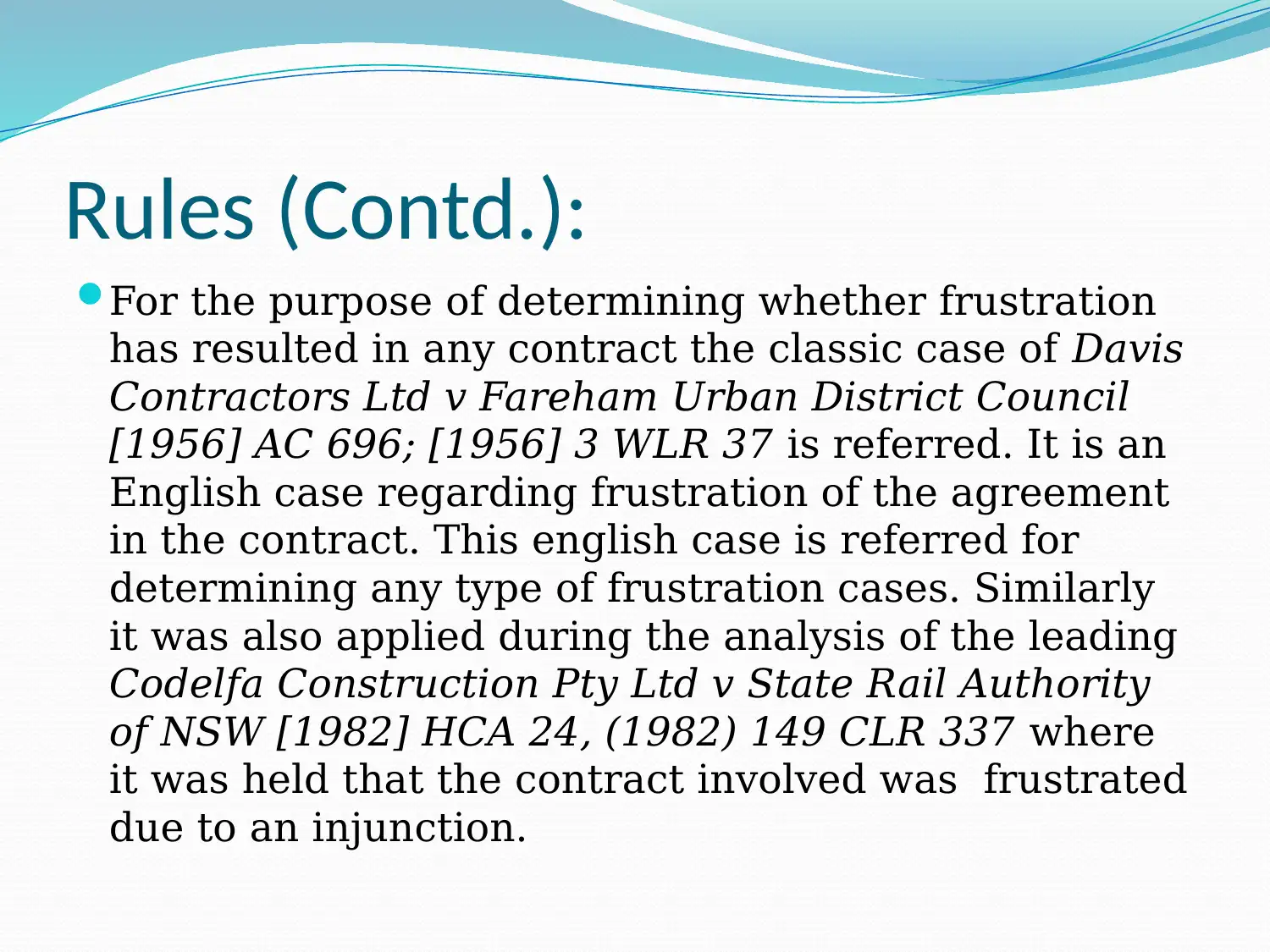
Rules (Contd.):
For the purpose of determining whether frustration
has resulted in any contract the classic case of Davis
Contractors Ltd v Fareham Urban District Council
[1956] AC 696; [1956] 3 WLR 37 is referred. It is an
English case regarding frustration of the agreement
in the contract. This english case is referred for
determining any type of frustration cases. Similarly
it was also applied during the analysis of the leading
Codelfa Construction Pty Ltd v State Rail Authority
of NSW [1982] HCA 24, (1982) 149 CLR 337 where
it was held that the contract involved was frustrated
due to an injunction.
For the purpose of determining whether frustration
has resulted in any contract the classic case of Davis
Contractors Ltd v Fareham Urban District Council
[1956] AC 696; [1956] 3 WLR 37 is referred. It is an
English case regarding frustration of the agreement
in the contract. This english case is referred for
determining any type of frustration cases. Similarly
it was also applied during the analysis of the leading
Codelfa Construction Pty Ltd v State Rail Authority
of NSW [1982] HCA 24, (1982) 149 CLR 337 where
it was held that the contract involved was frustrated
due to an injunction.
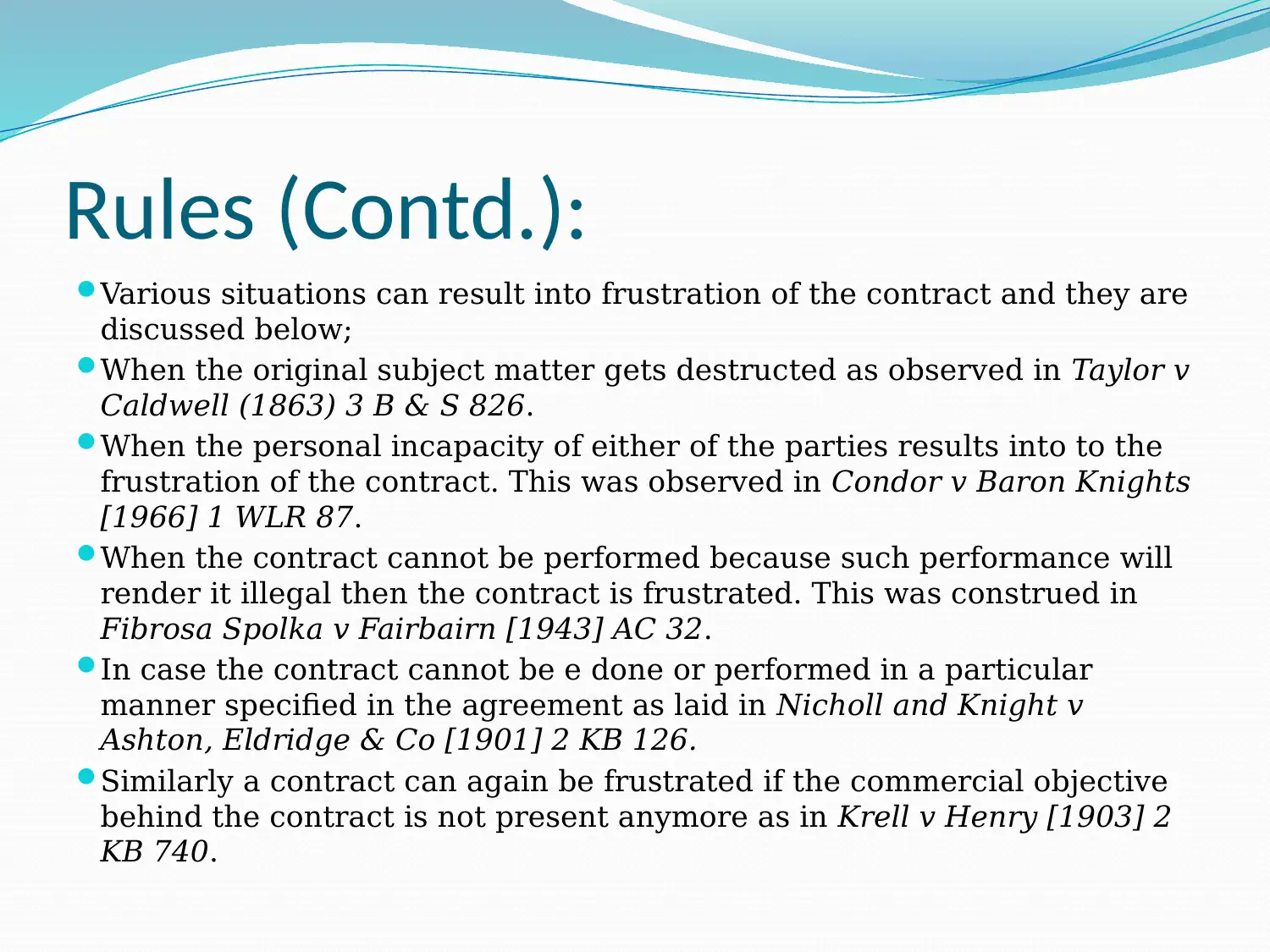
Rules (Contd.):
Various situations can result into frustration of the contract and they are
discussed below;
When the original subject matter gets destructed as observed in Taylor v
Caldwell (1863) 3 B & S 826.
When the personal incapacity of either of the parties results into to the
frustration of the contract. This was observed in Condor v Baron Knights
[1966] 1 WLR 87.
When the contract cannot be performed because such performance will
render it illegal then the contract is frustrated. This was construed in
Fibrosa Spolka v Fairbairn [1943] AC 32.
In case the contract cannot be e done or performed in a particular
manner specified in the agreement as laid in Nicholl and Knight v
Ashton, Eldridge & Co [1901] 2 KB 126.
Similarly a contract can again be frustrated if the commercial objective
behind the contract is not present anymore as in Krell v Henry [1903] 2
KB 740.
Various situations can result into frustration of the contract and they are
discussed below;
When the original subject matter gets destructed as observed in Taylor v
Caldwell (1863) 3 B & S 826.
When the personal incapacity of either of the parties results into to the
frustration of the contract. This was observed in Condor v Baron Knights
[1966] 1 WLR 87.
When the contract cannot be performed because such performance will
render it illegal then the contract is frustrated. This was construed in
Fibrosa Spolka v Fairbairn [1943] AC 32.
In case the contract cannot be e done or performed in a particular
manner specified in the agreement as laid in Nicholl and Knight v
Ashton, Eldridge & Co [1901] 2 KB 126.
Similarly a contract can again be frustrated if the commercial objective
behind the contract is not present anymore as in Krell v Henry [1903] 2
KB 740.
⊘ This is a preview!⊘
Do you want full access?
Subscribe today to unlock all pages.

Trusted by 1+ million students worldwide
1 out of 18
Related Documents
Your All-in-One AI-Powered Toolkit for Academic Success.
+13062052269
info@desklib.com
Available 24*7 on WhatsApp / Email
![[object Object]](/_next/static/media/star-bottom.7253800d.svg)
Unlock your academic potential
Copyright © 2020–2025 A2Z Services. All Rights Reserved. Developed and managed by ZUCOL.





